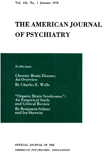"DELIRIUM TREMENS" FOLLOWING WITHDRAWAL OF ETHCHLORVINOL
Abstract
A mental syndrome indistinguishable from delirium tremens developed after withdrawal in a case of chronic ethchlorvinol intoxication. Our findings are compared with the 3 other published cases, which appear quite similar. As Engel and Romano have noted, this type of abstinence state, with cerebral overactivity, may well have more in common with the effects of hallucinogens than with the cerebral hypofunction of the usual delirium. Convulsive seizures are a regular feature of this syndrome, and anticonvulsants should be administered routinely in addition to the standard phenothiazine drugs.
Access content
To read the fulltext, please use one of the options below to sign in or purchase access.- Personal login
- Institutional Login
- Sign in via OpenAthens
- Register for access
-
Please login/register if you wish to pair your device and check access availability.
Not a subscriber?
PsychiatryOnline subscription options offer access to the DSM-5 library, books, journals, CME, and patient resources. This all-in-one virtual library provides psychiatrists and mental health professionals with key resources for diagnosis, treatment, research, and professional development.
Need more help? PsychiatryOnline Customer Service may be reached by emailing [email protected] or by calling 800-368-5777 (in the U.S.) or 703-907-7322 (outside the U.S.).



